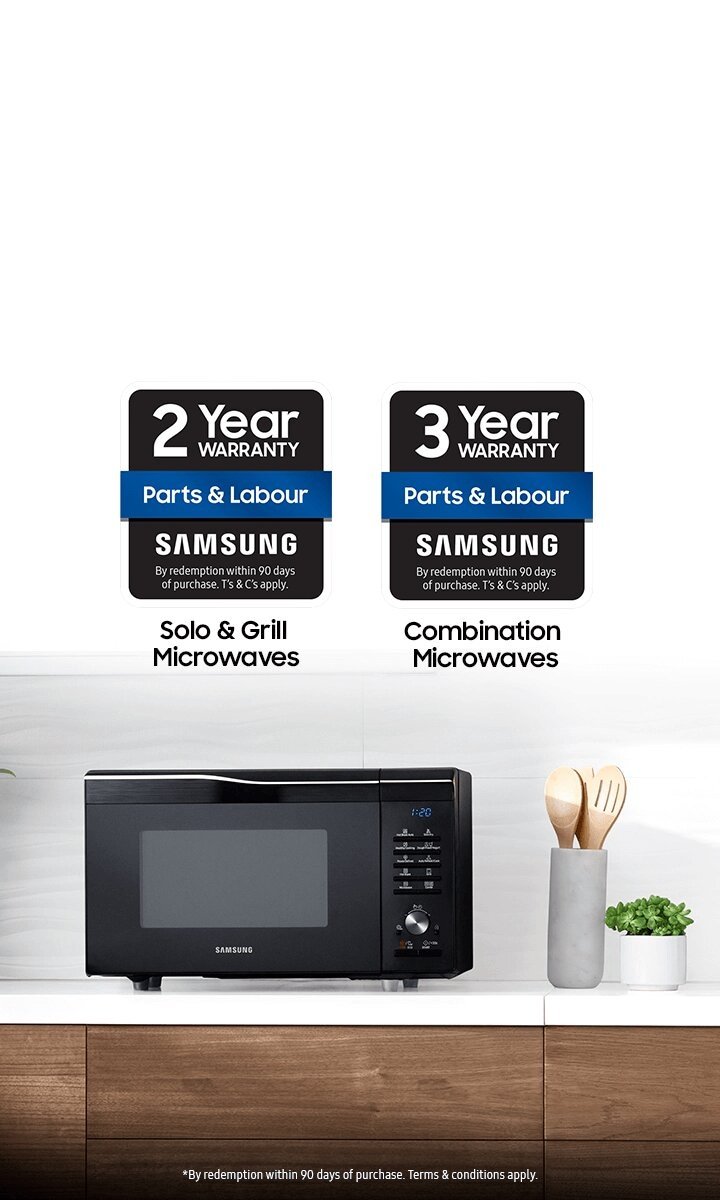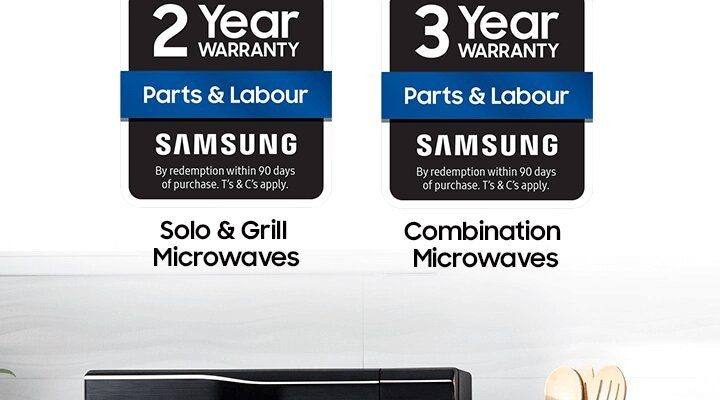
Think of buying an extended warranty like insurance for your microwave. Just like how you might insure your car or phone, you’re betting on what could go wrong in the future. But unlike insuring your car, the microwave is a smaller, simpler appliance — which begs the question: do you really need that extra coverage, or is it just an excuse to spend more? Let’s dive into what extended warranties mean specifically for Samsung microwaves and figure out if it’s a smart move or just a marketing trick.
What Exactly Is an Extended Warranty for Microwaves?
Extended warranties are essentially service contracts that pick up where your manufacturer’s standard warranty leaves off. When you buy a Samsung microwave, it usually comes with a one-year manufacturer warranty that covers defects in materials or workmanship. The extended warranty kicks in after that, often lasting an extra one to three years.
Here’s the thing: these warranties don’t cover everyday wear and tear or damage caused by accidents. So, if you accidentally splash soup inside the microwave, that probably won’t be covered. Instead, extended warranties focus on internal parts breaking down—like the magnetron (the component that creates microwaves), the control panel, or electrical issues.
Think about it like a lifeline if your microwave suddenly stops heating or the buttons stop working. The extended warranty promises to either repair or replace those faulty parts without you coughing up a hefty repair bill. But, of course, it comes at a cost upfront—usually a few extra dollars added at checkout or a separate purchase.
How Reliable Are Samsung Microwaves Without an Extended Warranty?
Samsung, as a brand, has built a solid reputation for making reliable kitchen appliances. Their microwaves have grown increasingly sophisticated with features like sensor cooking, smooth glass turntables, and easy-to-use digital controls. This reliability means that many Samsung microwaves run smoothly for years without any major hiccups.
Still, microwaves are no robots—they can develop issues. Common problems include a dead touchpad, loud noises from the magnetron, or uneven heating. But the good news is that these breakdowns tend to be relatively rare within the first couple of years.
Here’s a real-world example: a friend of mine had a Samsung microwave for almost five years before it started acting up—the display didn’t light up properly, and the cooking was inconsistent. Fortunately, by then, the standard warranty had expired, but the repair costs weren’t outrageous. If they had purchased an extended warranty, it probably would have saved them a bit of money—but only if the cost of the warranty was less than the repair bill.
What Does an Extended Warranty Typically Cover for Samsung Microwaves?
Let’s unpack what extended warranties usually cover when it comes to Samsung microwaves—because not all warranties are created equal. There are a few key areas most of these contracts focus on:
- Parts and Labor: Covers the cost to fix or replace internal microwave parts like the magnetron, control board, or turntable motor.
- In-Home or Carry-In Repair: Some plans offer in-home service, meaning a technician comes to fix your microwave. Others may require you to drop the unit off at a service center.
- Electrical Issues: Problems with wiring or circuit boards that cause the microwave to stop functioning.
However, it’s important to read the fine print. Extended warranties almost never cover accidental damage, cosmetic issues, or problems caused by misuse—so if you drop your microwave or spill something inside, the warranty might not help.
What’s Not Covered?
- Physical damage, like cracks or dents.
- Damage caused by improper installation or maintenance.
- Wear and tear from normal use.
- Power surges or electrical outages unless explicitly stated.
Knowing exactly what’s covered can save you from frustration if you ever need to file a claim.
How Much Does an Extended Warranty Cost for Samsung Microwaves?
Here’s where things get a bit tricky. The price of an extended warranty can vary widely based on the retailer, microwave model, and length of coverage. Generally, you’re looking at somewhere between $30 and $100. To put that in perspective, a Samsung microwave itself might cost anywhere from $100 to $300 or more depending on features.
So, you might wonder: is it better to spend an extra $50 now just in case, or save that money and risk paying for repairs later?
Here’s a useful way to think about it: if the likelihood of your microwave breaking down is low, and repair costs tend to be modest—often under $150—then paying for the extended warranty might not save you money. On the flip side, if your model is more expensive or has advanced features that are costly to fix, an extended warranty can feel like a safety net.
Comparing Extended Warranty to Repair and Replacement Costs
Think of your microwave like a car—it’s natural to compare repair costs to the price of replacement. Microwaves, however, tend to be less expensive to replace than cars. If your Samsung microwave breaks down after the warranty period and the repair bill comes close to or exceeds what a new microwave costs, chances are you might opt for a replacement anyway.
Repairs like replacing a magnetron can cost around $100 to $200 plus labor. If the microwave is older or less expensive, it might not be worth repairing.
Here’s a quick cost comparison to visualize it:
| Service | Approximate Cost |
|---|---|
| Extended Warranty | $30 – $100 (depending on coverage) |
| Typical Microwave Repair | $100 – $200 (parts + labor) |
| Replacement Microwave | $100 – $300+ |
If you’re someone who prefers the peace of mind of guaranteed repairs, the extended warranty might be worth it. But if you’re okay troubleshooting minor issues or replacing your microwave every few years, it’s probably less valuable.
How to Decide If an Extended Warranty Makes Sense for You
Honestly, whether to buy an extended warranty for your Samsung microwave boils down to your personal comfort level with risk and repair hassles.
- Consider your usage: If you cook often and rely heavily on your microwave, an extended warranty might help avoid downtime and repair costs.
- Think about your tech comfort: Are you okay troubleshooting small issues or buying a new microwave if something minor breaks? If yes, you might skip the warranty.
- Evaluate your budget: An extended warranty is like a prepaid safety net. If you’d rather pay a little extra upfront than a surprise bill later, it’s a smart choice.
- Check your existing coverage: Sometimes your credit card or homeowner’s insurance can cover appliance repairs, so double-check before buying.
Alternatives to Extended Warranties for Samsung Microwaves
Here’s the thing—extended warranties aren’t your only option to protect your microwave investment. Some alternatives can offer peace of mind without committing to extra contracts.
- Self-Help Troubleshooting: Samsung often provides detailed manuals and online support for common issues like resetting or syncing the microwave’s control panel.
- Home Warranty Plans: Some homeowner or renter insurance policies offer coverage for appliances, including microwaves, which can be worth exploring.
- DIY Repairs: For the tech-savvy, many microwave repairs involve simple tasks like replacing fuses or remotes (some even deal with troubleshooting battery-powered remotes if you have smart kitchen setups).
- Opt for Higher-Quality Models: Spending a bit more on a model known for durability can reduce the likelihood of costly repairs.
Each of these paths can sometimes be less expensive or more flexible than traditional extended warranties.
Final Thoughts: Is an Extended Warranty Worth It for Samsung Microwaves?
Here’s the honest truth: extended warranties for Samsung microwaves are a mixed bag. On one hand, they offer peace of mind and financial protection if your microwave suddenly fails after the manufacturer’s warranty expires. On the other, Samsung microwaves tend to be reliable, and repair costs don’t always justify the extra expense.
If you’re the sort of person who gets stressed out by potential breakdowns or hates the idea of unexpected repair bills, paying for an extended warranty might be a worthwhile investment. But if you feel comfortable troubleshooting minor issues or replacing the microwave when needed, you might be better off saving that money or exploring alternatives.
At the end of the day, just like choosing coffee over tea, it’s a personal preference. Weigh the pros, cons, and your own tolerance for risk. Either way, knowing what’s covered and what isn’t will help you make the right call for your kitchen’s microwave superhero.
